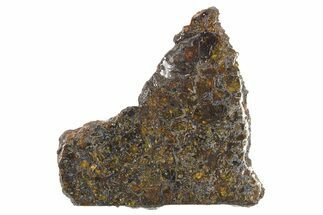This Specimen has been sold.
.45" Pallasite Meteorite (0.45 g) Slice - Imilac
This is a .45" wide (0.45 gram) slice of the Imilac pallasite meteorite. Though unpolished, the nickel-iron still retains a beautiful shine. It comes in its own labeled acrylic display case.
The Imilac Pallasite
Imilac is the name of a PMG pallasite found in the Atacama Desert of Chile in 1822. The meteorite likely fell sometime in the 14th Century, but the arid desert conditions kept the pallasite in quite good condition until its discovery.
Like many pallasites, Imilac is a stunner. Its large olivines in a fairly scant nickel-iron matrix are well-suited for slicing and translucent displays, even more so than most pallasites, thus it is one of the world's most coveted pallasites for collections.
Meteoritical Bulletin: Imilac Pallasite Meteorite
Imilac is the name of a PMG pallasite found in the Atacama Desert of Chile in 1822. The meteorite likely fell sometime in the 14th Century, but the arid desert conditions kept the pallasite in quite good condition until its discovery.
Like many pallasites, Imilac is a stunner. Its large olivines in a fairly scant nickel-iron matrix are well-suited for slicing and translucent displays, even more so than most pallasites, thus it is one of the world's most coveted pallasites for collections.
Meteoritical Bulletin: Imilac Pallasite Meteorite
About Pallasites
Pallasite meteorites are a class of stony-iron meteorites. They were once believed to have originated at the core-mantle boundary of asteroids that shattered through impacts, but a recent hypothesis is that they are a mixture of core and mantle minerals.
Pallasite meteorites consist of olivine (peridot) crystals surrounded by iron-nickel matrix. Upon acid etching, some pallasites display interweaving structures known as Widmanstätten patterns (or Thomson lines) in the metallic matrix. These structures are iron-nickel alloy crystals, typically kamacite and taenite, that cooled over millions of years in the vacuum of space.
Pallasites are quite rare: only about 200 are known, and only four have had observed falls. This represents less than 0.2% of all classified meteorites!
Pallasite Care
Pallasites are even more susceptible than most iron meteorites to rusting and deterioration due to moisture in the atmosphere; proper care includes keeping them in moisture-free environments. This is particularly important in areas with high humidity, such as Florida. All pallasite material we sell has been stabilized in some way, which will help with this issue, but care still needs to be taken to keep your treasure in good condition. Keep pallasites stored in a moisture-free environment, preferably with a corrosion inhibitor such as silica gel beads or a dehumidifier.
Pallasite meteorites are a class of stony-iron meteorites. They were once believed to have originated at the core-mantle boundary of asteroids that shattered through impacts, but a recent hypothesis is that they are a mixture of core and mantle minerals.
Pallasite meteorites consist of olivine (peridot) crystals surrounded by iron-nickel matrix. Upon acid etching, some pallasites display interweaving structures known as Widmanstätten patterns (or Thomson lines) in the metallic matrix. These structures are iron-nickel alloy crystals, typically kamacite and taenite, that cooled over millions of years in the vacuum of space.
Pallasites are quite rare: only about 200 are known, and only four have had observed falls. This represents less than 0.2% of all classified meteorites!
Pallasite Care
Pallasites are even more susceptible than most iron meteorites to rusting and deterioration due to moisture in the atmosphere; proper care includes keeping them in moisture-free environments. This is particularly important in areas with high humidity, such as Florida. All pallasite material we sell has been stabilized in some way, which will help with this issue, but care still needs to be taken to keep your treasure in good condition. Keep pallasites stored in a moisture-free environment, preferably with a corrosion inhibitor such as silica gel beads or a dehumidifier.
TYPE
Pallasite (PMG)
AGE
LOCATION
Atacama Desert, Chile
SIZE
.45" wide, Weight: 0.45 grams
CATEGORY
SUB CATEGORY
ITEM
#285888
 Reviews
Reviews












